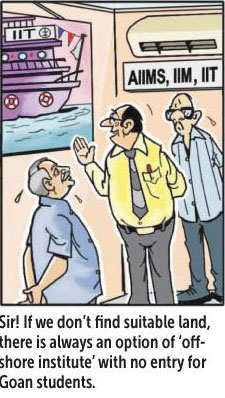
Team Herald
PANJIM: The High Court of Bombay at Goa on Thursday ruled that the office of the Archbishop Patriarch of Goa and Daman is not a public authority and set aside the order of the Goa State Information Commission (GSIC) which had stated that the Archbishop being a public office was liable for RTI replies.
The Goa State Information Commission on December 16, 2014 held that the Archbishop Patriarch of Goa and Daman is a ‘public authority’ as defined under Section 2(h) of the Right To Information (RTI) Act.
The Archbishop through his procurator Fr Valeriano Vaz had challenged the order of the Goa State Information Commissioner holding that the petitioner, as the Patriarchal Tribunal of the Archdiocese of Goa and Daman, is a ‘public authority’, as per the Section 2(h) of the RTI Act, 2005.
Antonia Michelle Abel from Alto-Porvorim on April 19, 2011, had applied to the Public Information Officer (PIO) for a certified photostat copy of His Eminence, Most Rev Fr Filipe Neri Ferrao’s Apostolic Letter of Appointment to the post of Archbishop-Patriarch of the East Indies.
She also sought a certified photostat copy of His Eminence, Most Rev Fr Oswald Cardinal Gracias’ Apostolic Letter of Appointment to the post of Archbishop of Bombay and other documents.
However, after perusing the application, Fr Rosario Oliveira, Judicial Vicar refused to accept the same. The High Court had referred the respondent’s application to the petitioner since most of the information sought by her was not available to the Court or did not pertain to its functions.
Arguing on behalf of the petitioner, Senior Advocate Zilman Coelho Pereira submitted that the petitioner, even in the capacity as the Patriarchal Tribunal, is not an authority or body constituted by or under the Constitution of India, law made by the Parliament or the State Legislature. He submitted that there is no notification issued or order made by the appropriate government constituting the petitioner as a public authority.
Adv Coelho Pereira submitted that the Canon Law under which the Ecclesiastical Tribunals are constituted is a private law that applies only to Roman Catholics. He told the court that Section 19 of this Decree was struck down by the High Court while hearing a petition in 2019.
Representing the respondent, Senior Advocate J P Mulgaonkar defended the GSIC’s impugned order. He cited High Court’s order, pointing out how it was the petitioner’s case that the Canon Law had statutory force and the orders of annulment made by the Patriarchal Tribunal considered under the Canon Law were binding upon Roman Catholics. The Patriarchal Tribunal was guaranteed by Articles 226 and 227 of the Constitution and therefore Patriarchal Tribunal was a public authority under RTI Act, he said.
Justice Mahesh Sonak in his order observed that the Patriarchal Tribunal is not established or constituted under the Constitution or by notification issued order made by the appropriate government and that no contention was produced about the Patriarchal Tribunal being covered by the definition in Section 2(h) of the RTI Act.
The court stated that the GSIC should have examined whether the petitioner, when acting as a Patriarchal Tribunal, could be held to be an authority or body established or constituted by a law made by the Parliament or the State Legislature.
